 Janus Head Janus Head
11.1&2

Travels Inside the Archive
Robert Gibbons
Edge of Maine Editions

Beyond Time
New & Selected Work
1977 - 2007
Robert Gibbons
 The Age of Briggs & Stratton The Age of Briggs & Stratton
Peter Culley
|

Zao Wou-ki
b. 1921
_______________________
John Latta on Philip Whalen's Notebooks (1957-1966)
Isola di Rifiuti
Strong sense of Whalen’s happier kinship with the natural world, the “nervous & nowhere” slaked by observing and naming, a manifest welcome need to be solitary: “Friday 17:VII:64 . . . at Mist Falls on the Kings river in Paradise Valley . . .The butterfly, California Sister (Limenitis Bredowii) also loiters hereabouts. In the meadows below: white mariposa, red columbine, lupine, pussy paws, cow parsnip, elderberry, paintbrush, monkey flower, gilia, various yellow daisy-like flowers, white daisies, a delicate large pale blue bell-trumpet flower (tall), turk’s cap lilies & many more. Here at the pine tree foot is a complicated set of large mosses. . . . The tall pale blue trumpets are Harvest Brodiaea (B. Coronaria).” Lovely, too, the report of flying with Michael McClure, San Francisco to New York, with stops: Salt Lake City, Denver, Omaha, Chicago. In Omaha: “Dinky terminal redbrick & takeoff delayed for a brake repair—& next, Chicago. As it grew lighter across Nebraska, land changed from Mondrian to expensive marble floor to flagstone-like texture. Flatness a sense of tragedy &c.” Back to the poems....(more)
_______________________

Winter Still Life
1956
William Scott
1913-1989
_______________________
Sidelined
Elfriede Jelinek
Nobel Prize in Literature 2004
Translation from German by Martin Chalmers
Is writing the gift of curling up, of curling up with reality? One would so love to curl up, of course, but what happens to me then? What happens to those, who don’t really know reality at all? It’s so very dishevelled. (....) The writing, that deals with what happens, runs through one’s fingers like the time, and not only the time, during which it was written, during which life stopped. No one has missed anything, if life stopped. Not the one living and not dead time, and the one who is dead not at all. When one was still writing, time found its way into the work of other writers. (....) How can the writer know reality, if it is that which gets into him and sweeps him away, forever onto the sidelines. From there, on the one hand, he can see better, on the other he himself cannot remain on the way of reality. There is no place for him there. His place is always outside. Only what he says from the outside can be taken up inside, and that because he speaks ambiguities. And then there are already two who fit, two whose faces are right, who warn, that nothing is happening, two who construe it in different directions, reach out to the inadequate grounds, which have long ago broken off like the fangs of the comb. Either or. True or false. It had to happen sooner or later, since the ground as building ground was quite inadequate. And how could one build on a bottomless pit anyway? But the inadequacy that enters the writers’ field of vision, is still adequate enough for something, that they could also take or leave. They could take or leave it, and they do leave it. They don’t kill it. They merely look at it with their bleary eyes, but it does not become arbitrary because of this bleary gaze. The gaze is well aimed. Whatever is struck by this gaze says, even as it sinks down, although it has hardly been looked at, although it has not even been exposed to the sharp gaze of the public, whatever has been struck never says, that it could also have been something else, before it fell victim to this one description. It says exactly what had been better left unsaid (because it could have been better said?), what always had to remain unclear and groundless. Too many have already sunk into it up to their stomachs. It’s quicksand, but it doesn’t quicken anything. It is groundless, but not without grounds. It is as you like, but it is not liked.
The sidelines are at the service of the life, that precisely does not take place there, otherwise we would not all be in the thick of it, in the fullness, the fullness of human life, and it is at the service of the observation of the life, which is always taking place somewhere else. Where one is not....(more)
_______________________
Poems for the Stone Lady
To the Short Day and Its Great Arc of Shadow
To the short day and its great arc of shadow,
I’ve come, alas, and to the paling hills,
now that all colors vanish from the grass;
yet this my longing does not change its green,
rooted as it is still in the hard stone
that speaks and hears as though it were a woman.
In a like fashion this new, wondrous woman
stays frozen just as snow within the shadow;
unmoved, not any more than is a stone,
by the sweet season that warms up the hills
and makes them turn once more from white to green,
covering them with flowerets and grass.
... (more)
Dante - Lyric Poems
parallel translation by Joseph Tusiani
_______________________
The evil of banality
Costica Bradatan on Herta Müller's The Appointment
globe & mail
... comparatively few literary works are available in the West to represent that curious mix of bleakness, absurdity, cruelty and senselessness that was Ceausescu's Romania.
There is a Romantic misconception that terror has always to be impressive, fierce and appropriately Luciferian – in other words, that terror is nothing if it is not spectacular. However, that's rarely the case in real life. As Czeslaw Milosz excellently put it in The Native Realm, “Terror is not … monumental; it is abject, it has a furtive glance, it destroys the fabric of human society and changes the relationships of millions of individuals into channels for blackmail.” Terror can be mediocre, even idiotic, yet omnipresent. Terror can be terribly banal, utterly un-Romantic, but never-ending. Terror is when the secret police persuade your best friend to inform on you; when objects start moving around your room in your absence; when the secret police interrogator tells you, right before you leave his office after a day-long interrogation, that “accidents do happen,” or when your friends start committing (poorly) staged suicides.
That's why Herta Müller's work is so important: It maps out, with surgical precision, this mediocre yet sinister face of European totalitarianism, which is something that has been largely unaccounted for. Her novels document the oppressive fears and anxieties of a world turned upside-down, a world where the secret police do not necessarily kill you, but mess up your life enough to make you lose your mind. ...(more)
_______________________
Shards from the empire
Zinaida Lindén
Translated by David Hackston
books from finland
Gustav’s greatest passion is for genealogy. He dedicates his free time to sketching coats of arms; masses of colourful, noble crests.
Gustav asked me to do a translation. I sat for ten days trying to decipher a couple of pages from a Russian archive dating from the 1830s. Sentences like, With this letter, we hereby give notice of our gracious decision.‘
The intricate handwriting belonged to some collegiate registrar or other. Perhaps Gogol’s Khlestakov.
Gustav belongs to a renowned noble family. His ancestors made pea soup for Erik XIV.
But Gustav knows nothing of my ancestors. To his mind I have no auspicious roots, though I too am a shard from the empire. Not the Romanov Empire, of course, but the ‘empire of evil’: I was a one-time Homo Sovieticus....(more)
_______________________
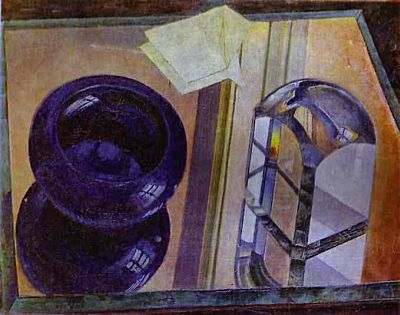
Still Life with Blue Ashtray
1920
Kuzma Petrov-Vodkin
1878-1939
_______________________
Notes on a World Class City:
Vancouver's Poet Laureate Explains Why He Declined to Participate in Olympic Celebrations
Brad Cran
_______________________
Congratulations and thanks to Nick Piombino for seven years of Fait Accompli

Petrarch and Laura
A Candy Box of History's Sappiest Literary Lovers
Gilbert Alter-Gilbert
a journey round my skull
_______________________
The Paranoid Style in American Politics
Richard Hofstadter
Harper’s Magazine, November 1964
The paranoid spokesman sees the fate of conspiracy in apocalyptic terms—he traffics in the birth and death of whole worlds, whole political orders, whole systems of human values. He is always manning the barricades of civilization. He constantly lives at a turning point. Like religious millenialists he expresses the anxiety of those who are living through the last days and he is sometimes disposed to set a date for the apocalypse. (....)
The enemy is clearly delineated: he is a perfect model of malice, a kind of amoral superman—sinister, ubiquitous, powerful, cruel, sensual, luxury-loving. Unlike the rest of us, the enemy is not caught in the toils of the vast mechanism of history, himself a victim of his past, his desires, his limitations. He wills, indeed he manufactures, the mechanism of history, or tries to deflect the normal course of history in an evil way. He makes crises, starts runs on banks, causes depressions, manufactures disasters, and then enjoys and profits from the misery he has produced. The paranoid’s interpretation of history is distinctly personal: decisive events are not taken as part of the stream of history, but as the consequences of someone’s will. (....)
The paranoid style is not confined to our own country and time; it is an international phenomenon. Studying the millennial sects of Europe from the eleventh to the sixteenth century, Norman Cohn believed he found a persistent psychic complex that corresponds broadly with what I have been considering—a style made up of certain preoccupations and fantasies: “the megalomaniac view of oneself as the Elect, wholly good, abominably persecuted, yet assured of ultimate triumph; the attribution of gigantic and demonic powers to the adversary; the refusal to accept the ineluctable limitations and imperfections of human existence, such as transience, dissention, conflict, fallibility whether intellectual or moral; the obsession with inerrable prophecies…systematized misinterpretations, always gross and often grotesque.”
This glimpse across a long span of time emboldens me to make the conjecture—it is no more than that—that a mentality disposed to see the world in this way may be a persistent psychic phenomenon, more or less constantly affecting a modest minority of the population. But certain religious traditions, certain social structures and national inheritances, certain historical catastrophes or frustrations may be conducive to the release of such psychic energies, and to situations in which they can more readily be built into mass movements or political parties. In American experience ethnic and religious conflict have plainly been a major focus for militant and suspicious minds of this sort, but class conflicts also can mobilize such energies. Perhaps the central situation conducive to the diffusion of the paranoid tendency is a confrontation of opposed interests which are (or are felt to be) totally irreconcilable, and thus by nature not susceptible to the normal political processes of bargain and compromise. The situation becomes worse when the representatives of a particular social interest—perhaps because of the very unrealistic and unrealizable nature of its demands—are shut out of the political process. Having no access to political bargaining or the making of decisions, they find their original conception that the world of power is sinister and malicious fully confirmed. They see only the consequences of power—and this through distorting lenses—and have no chance to observe its actual machinery. A distinguished historian has said that one of the most valuable things about history is that it teaches us how things do not happen. It is precisely this kind of awareness that the paranoid fails to develop. He has a special resistance of his own, of course, to developing such awareness, but circumstances often deprive him of exposure to events that might enlighten him—and in any case he resists enlightenment.
We are all sufferers from history, but the paranoid is a double sufferer, since he is afflicted not only by the real world, with the rest of us, but by his fantasies as well....(more)
via Jesus' General
_______________________

Wonder
João Margalha
via Joerg Colberg
_______________________
'To Those Who Follow in Our Wake'
Bertolt Brecht
translated by Scott Horton
I
Truly, I live in dark times!
An artless word is foolish. A smooth forehead
Points to insensitivity. He who laughs
Has not yet received
The terrible news.
What times are these, in which
A conversation about trees is almost a crime
For in doing so we maintain our silence about so much wrongdoing!
And he who walks quietly across the street,
Passes out of the reach of his friends
Who are in danger?
It is true: I work for a living
But, believe me, that is a coincidence. Nothing
That I do gives me the right to eat my fill.
By chance I have been spared. (If my luck does not hold, I am lost.)
They tell me: eat and drink. Be glad to be among the haves!
But how can I eat and drink
When I take what I eat from the starving
And those who thirst do not have my glass of water?
And yet I eat and drink.
I would happily be wise.
The old books teach us what wisdom is:
To retreat from the strife of the world
To live out the brief time that is your lot
Without fear
To make your way without violence
To repay evil with good –
The wise do not seek to satisfy their desires,
But to forget them.
But I cannot heed this:
Truly I live in dark times!
...(more)
thanks to languagehat for bringing this more complete translation (including the original) to my attention.
_______________________

detail
Photographic Medley
Emma Bee Bernstein
1985 - 2008
Slideshow curated by Antonia Pocock for
"Emma Bee Bernstein -- Masquerade: A Retrospective"
DOVA Temporary, University of Chicago, February 2010.

Still Life with Birds of Paradise
1950
Max Beckmann
_______________________
To Those Born After
I
To the cities I came in a time of disorder
That was ruled by hunger.
I sheltered with the people in a time of uproar
And then I joined in their rebellion.
That's how I passed my time that was given to me on this Earth.
I ate my dinners between the battles,
I lay down to sleep among the murderers,
I didn't care for much for love
And for nature's beauties I had little patience.
That's how I passed my time that was given to me on this Earth.
The city streets all led to foul swamps in my time,
My speech betrayed me to the butchers.
I could do only little
But without me those that ruled could not sleep so easily:
That's what I hoped.
That's how I passed my time that was given to me on this Earth.
Our forces were slight and small,
Our goal lay in the far distance
Clearly in our sights,
If for me myself beyond my reaching.
That's how I passed my time that was given to me on this Earth.
II
You who will come to the surface
From the flood that's overwhelmed us and drowned us all
Must think, when you speak of our weakness in times of darkness
That you've not had to face:
Days when we were used to changing countries
More often than shoes,
Through the war of the classes despairing
That there was only injustice and no outrage.
Even so we realised
Hatred of oppression still distorts the features,
Anger at injustice still makes voices raised and ugly.
Oh we, who wished to lay for the foundations for peace and friendliness,
Could never be friendly ourselves.
And in the future when no longer
Do human beings still treat themselves as animals,
Look back on us with indulgence.
Bertolt Brecht
Feb. 10, 1898 - Aug. 14, 1956
_______________________
Welcome to the Cultural Goodwill Revolution:
On Class Composition in the Age of Classless Struggle
Marc J Leger
From the outset, what the analysis of class composition suggests for cultural praxis is something along the lines of what Žižek refers to as revolution, the dialectical action of participating and not participating with those institutional arrangements that we cannot do without. This sinthomeopathic activity is set against three decades or more of complicit reconciliation with consumer capitalism that has by and large ignored the practical reality and consequences of capital accumulation and the restructuring of global capitalism. Lacan's concept of the sinthome is defined as a stage beyond the fundamental fantasy (ideological misrecognition), and which allows for a nonpathological (political) subjectivization (organization) of the symptom (cultural practice). In his Four Fundamental Concepts of Psychoanalysis, Lacan presented the dilemma of justified paranoia. In our case, this would mean that to oppose the symbolic order of institutionalized art practice is to risk exclusion; to negotiate with it is to allow one's actions to be determined by it. Since artistic freedom can no longer be thought of in terms of sacrificing oneself to the competitive struggle of aesthetic transgression, one must construct what after Lacan we could call sinthomeopathic solutions: lending oneself to institutional arrangements, the symptoms of contemporary cultural production, while still maintaining the fantasy of critical distance. This implies a "tarrying with the negative," which includes practical approaches to autonomy, institutions and the state. Without this a popular front will exist in name only and thousands more micro systems will contribute to the expansion of the system of systems....(more)
Journal of Aesthetics & protest - issue 7
_______________________
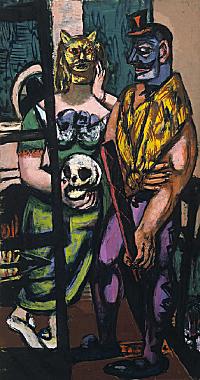
Masquerade
1948
Max Beckmann
_______________________
"Interview with Michel Butor: The Writer As Janus"
Anna Otten
To cling to traditional ways was an illusion people had. That is no longer possible. The idea of doing is important. And to write is action par excellence.
Some things have to be finished, the work itself has to expand. The writer is a tenuous beginning, we cannot even say a beginning—an articulation. He is situated midway between the older and the newer reality. When he publishes his work and people read and respond, he helps to shape the future that will in turn become a past. When the writer dies, his work will survive.
An efficient work of literature will close some bad periods, but that closing is not permanent. Even during unproductive cultural epochs, something can be redeemed. We have never closed the Dark Ages. Our own age is still dark and we hear voices rising out of it. We have to change our past in order to change our future. We must turn back and throw light on it to see it in a new way. What we need is archeology around and in ourselves.
There is a strong link between inspiration and childhood. When Proust wanted to experience a new childhood and become a writer, he had to go back to his first childhood. Things forgotten wait in the library of your mind. It is a question of having to look back ward and yet not go backward at the same time. To free Euridyce from Hades, Orpheus was forbidden to look back at her and when he did, he lost her. Almost the same legend can be found in the Bible. It is the story of Lot’s wife, who, when fleeing Sodom, looked back and was transformed into a pillar of salt. We have to be able to look forward, but to bring back Euridyce you have to go back to Hades. It was a very powerful memory, which was at the origin of the journey to hell. We always have to descend into hell in order to got out of it. It’s also an open cycle....(more)
_______________________
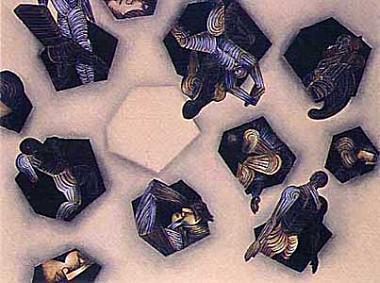
Personajes en conflicto
1997
Mario Toral
Chile
b. Feb. 12, 1934
_______________________
Night of the Living Dead: The party of Palin
Jim Chaffee
nthposition
Remember that the militarist conservatives are not fiscal conservatives. For them, government spending for "defense" is not spending. This is part of the Reagan doctrine, to deny the resultant deficits and debt from defense spending funded by freshly printed money. This was adapted by Bush the Younger who refused to put his war costs into the budget, thereby denying his regime was spending money. To rephrase Goldwater, Printing money in the defense of liberty is not printing money.
The US is in the process of falling into the hands of cannibals. I would say, in fact, that the militaristic movement calling itself conservative is a movement of cannibals. But US consumers are also cannibals, and amongst them are the brainless and soulless living-dead conservatives who will eat your brain and the brains of all your neighbors....(more)
_______________________

Latitude of Silence
You Li
via riley dog
_______________________
The New Deal in Reverse
Steve Fraser
They read the lesson of humiliating defeat in Massachusetts and the voluble hostility of the populist right as an advisory to move further to the right. Tacking rightward, tailoring policy to match the tastes of business and finance, cautioning Americans that they’ll need to tighten their belts (as if they hadn’t already been doing so), adopting the parsimonious sanctimony of the balanced budget, slimming down their great expectations until what little is left mocks the hopes of so many who elected them—all of this is seen as smart politics.
Smart like a chicken. This is the same cleverness that, beginning with Ronald Reagan’s triumph, turned the Democratic Party into Republican-lite. Shrewdness like this helps explain, in part, why Obama’s inner circle and Democratic leaders took the early, fateful steps that were bound to land them where they find themselves today.
Would the Republican right and its tea-party populists—marginal, mockable political freaks less than a year ago—have enjoyed their current growth spasm if the administration hadn’t been committed to bailing out the very institutions most people considered the villains responsible for running this country into a ditch? Would the Democratic Party have been in imminent danger of losing its faltering grip on Congress had it found the will to pursue serious health-care reform and environmental legislation, or wrestled the financial oligarchy to the mat as Roosevelt did? A long generation spent cowering in the shadows of the conservative ascendancy has left the newly empowered Democrats congenitally incapable of seizing their own historic moment....(more)
_______________________
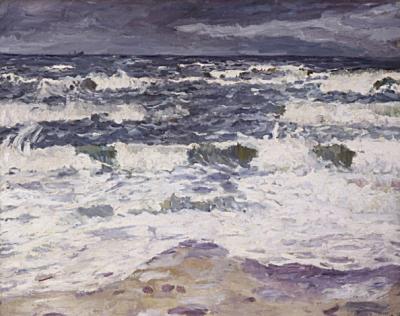
Seascape
c.1907
Max Beckmann
_______________________
Lost Caul: Clayton Eshleman on Lascaux
courtesy of Pierre Joris
The cave of Lascaux, with its 600 paintings and 1500 engravings, is the most magnificent example of the Upper Paleolithic (32,000 to 9,000 years ago) creative force in human culture which surged into, and made sacred, for the first time, subterranean levels. The fauna that roam, trot, and gallop the walls of Lascaux’s 17,000 year old galleries, while painted by the Cro-Magnon people, exist outside of a human dimension—they are 100% animal and, with a few exceptions, are devoid of anthropomorphic gestures. Only in the obscure signs cropping up around and across the animal bodies does a symbolism assert that these divine beasts are being shifted into a human context. Such signs circulate around the animals either like incipient corrals and brands, looking for ways to move in, or as alphabetic gestures, linking the animals’ coats and gestures with seasonal changes.
Specific achievements at Lascaux include: the most important prehistoric signs, the use of an imaginary ground level, clear patterns of animals within each decorated panel, trick perspectives, breath from muzzles marked by dots or short strokes, dappled appearances created by powder or liquid pigments blown through bone tubes, hazy manes created by light sponging, sharp outlines made by use of movable marking instruments.
(....)
What follows is a time line setting forth Lascaux’s tragic historical adventure....(more)
_______________________
Shadows of Crows: Reading Veils
Robert Gibbons
The sun drew me, heliotropically, to the window-seat, both of us in turmoil? I
alone in crisis. Quiet crisis. Long past gnashing of tongue & teeth. I stretched out,
robe open to catch as much heat as possible, & still remain decent to the world
outside. I read. A conversation between Derrida & Cixous, very Hebrew. His
tactile, visible tallith, her veiled, hidden abyss. At about that moment a shadow of
a crow landed on the eaves above me, then another whose actual black tail I
could see as I stared up into the bright sky. Back to reading, I began to hear what
sounded like neighborhood women, or ancient, shawled gossips, crows begun to
talk. All I’ve ever heard before were loud calls, but here a few feet away, the
subtle modulations, the range, minor repetition, exchange, diminution of two
voices.

Michael Roulier
Michael Roulier on Flickr
_______________________
Veils
Helene Cixous and Jacques Derrida
Translated by Geoffrey Bennington
aaaarg - free reg. req.
A Silkworm of One's Own
Points of View Stitched on the Other Veil
Jacques Derrida
Before the verdict, my verdict, before, befalling me, it drags me down with it in its fall, before it's too late, stop writing. Full stop, period. Before it's too late, go off to the ends of the earth like a mortally wounded animal. Fasting, retreat, departure, as far as possible, lock oneself away with oneself in oneself, try finally to understand oneself, alone and oneself. Stop writing here, but instead from afar defy a weaving, yes, from afar, or rather see to its diminution. Childhood memory: raising their eyes from their woolen threads, but without stopping or even slowing the movement of their agile fingers, the women of my family used to say, sometimes, I think, that they had to diminish. Not undo, I guess, but diminish, i.e. , though I had no idea what the word meant then but I was all the more intrigued by it, even in love with it, that they needed to diminish the stitches or reduce the knit of what they were working on. And for this diminution, needles and hands had to work with two loops at once, or at least play with more than one.
-Which has nothing to do, if I understand aright, with the mastery of a Royal Weaver or with Penelope's ruse, with the metis of weaving-unweaving. Not even a question of pretending, as she did one day, to be weaving a shroud by saving the lost threads [les fils perdus: the lost sons] , thus preparing a winding sheet for Laertes, King of Ithaca and father of Odysseus, for the very one that Athena rejuvenated by a miracle. Don't lose the thread, that's the injunction that Penelope was pretending to follow, but also pretense or fiction, ruse ("I should be grateful to you young lords who are courting me, now that King Odysseus is dead, if you could restrain your ardor for my hand till I have done this work, so that the threads I have spun may not be utterly wasted. It is a winding sheet for Lord Laertes. When he succumbs to the dread hand of Death that stretches all men out at last, I must not risk the scandal there would be among my countrywomen here if one who had amassed such wealth were put to rest without a shroud"!) . Whereas in diminution, if I understand aright, the work is not undone. . .
-No, nothing is undone, on the contrary, but I would also like, in my own way, to name the shroud, and the voyage, but a voyage without return, without a circle or journey round the world in any case, or, if you prefer, a return to life that's not a resurrection, neither the first nor the second, with and without the grand masters of discourse about the Resurrection, Saint Paul or Saint Augustine . . .
-My God, so that's all your new work is, is it, neither an Odyssey nor a Testament . . .
_______________________
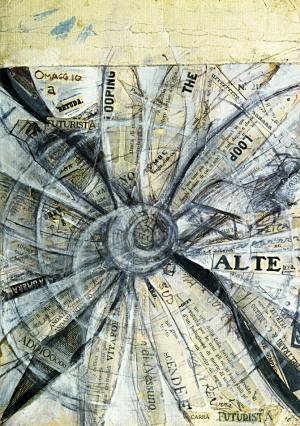
Omaggio a Betuda Futurista
1915
Carlo Carrà
b. Feb. 11, 1881
_______________________
Journal of Cultural & Religious Theory 10.2 Spring 2010
Special Edition:
H.D. and the Archaeology of Religion
"Tear Us An Altar": [pdf]
Erotic Violence, and the Self-Unmade Prophet
Shannon McRae
H.D., a lifelong student of Greek culture and artistic consciousness, as well as a student and analysand of Freud’s, forged a poetics from the fusion of mythic consciousness and emotional conflict. Artistically, the results were mixed. Although her early short Imagist poems were justly celebrated, her later poetry suffered from uneven critical reception in her lifetime, and most of her prose until recently went unpublished. The prose, which includes autobiographical fiction, memoirs, notes toward poetic theory, conversations with Sigmund Freud along with subsequent psychological discoveries, and meditations on the common spiritual truths between Classic mythology and Christian belief, represents a complex, layered record of an elusive, shifting consciousness, a nonlinear retrospective narrative that traces the evolution of artistic perception simultaneously rooted in gender and evasive of it. Like Yeats and Eliot, as well as other modernists such as Ezra Pound and D.H. Lawrence, H.D. regarded writing as a mode of prophecy, and the act of writing as attainment of privileged access to a cultural mind that originated in the mythical past. But H.D. was unique in explicitly arguing for crisis, trauma, erotic dissolution, and emotional breakdown as a path to higher artistic and spiritual truth. _______________________
"Visitation": Two Projections on/of Nature
Mark Doty
(The Paris Review #196)
courtesy of Philip Metres
When I heard he had entered the harbor,
and circled the wharf for days,
I expected the worst: shallow water,
confusion, some accident to bring
the young humpback to grief.
Don't they depend on a compass
lodged in the salt-flooded folds
of the brain, some delicate
musical mechanism to navigate
their true course? How many ways,
in our century's late iron hours,
might we have led him to disaster?
That, in those days, was how
I'd come to see the world:
dark upon dark, any sense
of spirit an embattled flame
sparked against wind-driven rain
till pain snuffed it out. I thought,
This is what experience gives us ,
and I moved carefully through my life
while I waited. . . Enough,
it wasn't that way at all. The whale
—exuberant, proud maybe, playful,
like the early music of Beethoven—
...(more)
Behind the Lines: Poetry, War, & Peacemaking
_______________________
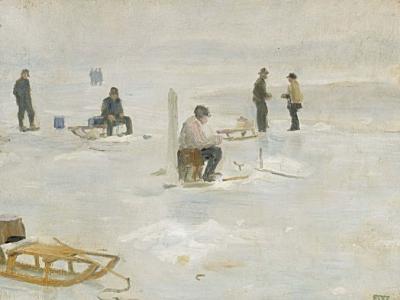
Winter Fishing
1906
Erik Werenskiold
(11 February 1855 – 23 November 1938)
_______________________
Nine
Anne Tardos
conjunctions
(....)
5
Djibouti laptop polyrhythmic stevedore imagination for example people die.
Yeah yeah yeah listen to the music around you.
Plagiarize and cannibalize yourself by mining your own work.
Counter-sadistic anti-suffering vraiment triste faché becoming real.
Don’t think for a minute that you don’t exist.
First, get used to the sound of my voice.
Bob Perelman knows what Maisie knew about her parents.
Katy Lederer didn’t have money. She was a poet.
Mitch Highfill keeps a pet moth and an elephant.
...(more)
_______________________
April Fool
Tom Clark
Exquisite Corpse
(....)
Fools walk these black and empty American mystery streets. One sees them passing, floating much as shadows float in dreams, down that Avenue of famous restaurants, some darkened now as the custom of the wealthy dissipates. The fools linger by the trash bins spare-changing. Lost, left behind, forgotten, and not on a hill. Then hours later the positions have changed slightly. A slow bedraggled parade of souls, moving without cause or purpose.
They move along that celebrity thoroughfare which is a rift, one side assigned the rich, the other the poor. The two sets of humans inhabit parallel worlds, neither appearing cognizant of the other, denizens of contradictory dimensions.
Then there are nights it seems madmen line this street. Loitering here and there they drift, and the voices come out, speaking through them. They do not seem quite persons to us, until we recall that the Latin for person or persona means to sound through, that each of us is effectively no more than the sock puppet of whatever it is blows through us, and there is no one of whom standing down wind is an uninterrupted pleasure.
...(more)
_______________________

Michael Roulier
_______________________
Two Stories
Aleš Šteger
translated from the Slovenian by Aljaž Kovac and Forrest Gander
conjunctions
B—as in Bruno
Quietly, covertly, bears have toddled into the name Berlin. They took the Polabian-Slavic route through the root word brl, meaning swamp, but once the residents of Berlin levied the swampy banks of the river Spree, the bears walked right into the T-shirts and key pendants of tourists, they stuck their tongues out at the world from the city’s coat-of-arms and, after their winter sleep, they reared up into the caps of skaters and the balustrades of bridges. Instead of damp socks and riverine dwellings sloshed by swollen waters, people started to think of these shaggy ones when they uttered the word Berlin, even after the bears fled South. A few remained. In front of the entrance to some hotel, bank or public institution, you might still find a bear performing a handstand, dressed in a Russian folk costume or in the robes of a Malaysian Buddhist priest or as a soccer player or, worst of all, as a Bavarian in leather knickers.
...(more)

Chilseo, South Korea
New Trees
Robert Voit
via
_______________________
from Velocity But No Location
Rosmarie Waldrop
salt
There is pleasure in composition, in grasping the connection of the one and the many. The way we gradually discover how the dancer's movements are anchored in, and anchor, the axis she spins around, the way the backbone is held up by the muscles acting in concert or our sense of self by the mirror. Without it we are forced into constant activity to make up for the lacking image. Like the squid or dogfish, being heavier than water, must swim continually throughout their lives. Desperate activity, I say, and often fruitless, all brains incessantly active, down into our dreams, leaves off the fever tree, electric.
It's difficult to realize the groundlessness of our beliefs, but my style is fragmentary in any case, and my life as perplexed as my writing. Wrong connection, conniption, conclusion, shirt inside out, buttoned wrong, short breath. Rain comes, and mist clots about the trees. I reshoulder the wrong assumptions, say “I know” the way we'd say “I am in pain” and don't question evidence or self. But then, clear conscious discrimination is an accident between the vapors of the mind and the opaque body, the cracking of knuckles, biting of fingernails. Still, I believe that all mammals, apart from the duckbilled platypus and the porcupine anteater, give birth to live young, and the females nurse them.
At some point the temperature drops to frustration, powdery snow swallowing all sounds, tires, boots, and explanations. Then we have to pass to mere description and admit our secret affinity with confusion, which is as fundmental as order even though all living things labor to maintain the latter. No crystall ball or balm for the sorrows of reason. Which means treasure or treason depending on the conversation you have your foot in, and water, water. Meanwhile a man enters a bar, another goes by in the street, a woman looks in the mirror, a cat hisses at a cat, and a fly buzzes on the window pane.
Salt international literary magazine
via The Page
_______________________

Carlo Farneti's illustrations
for a 1935 edition of Baudelaire's
Les Fleurs du Mal
A Journey Round My Skull
_______________________
The Starling
Amy Lowell
(February 9, 1874-May 12, 1925)
"`I can't get
out', said the starling."
Sterne's
`Sentimental Journey'.
Forever the impenetrable wall
Of self confines my poor rebellious soul,
I never see the towering white clouds roll
Before a sturdy wind, save through the small
Barred window of my jail. I live a thrall
With all my outer life a clipped, square hole,
Rectangular; a fraction of a scroll
Unwound and winding like a worsted ball.
My thoughts are grown uneager and depressed
Through being always mine, my fancy's wings
Are moulted and the feathers blown away.
I weary for desires never guessed,
For alien passions, strange imaginings,
To be some other person for a day.
Amy Lowell - Impressionist Poetpart of Modernism: The American Salons
_______________________
The structure and silence of the cognitariat
Christopher Newfield
eurozine
There is indeed a conflict between the modes in which knowledge is produced and owned within cognitive capitalism. But this does not translate into a political conflict of the kind Gorz calls class war. Analysts often suggest that two general phenomenon can undermine a productive contradiction like that of cognitive capitalism. The first is immiseration, in which bad conditions force a revolt. The second is inefficiency, in which elites tire of wasting money controlling people and not getting that last 20 per cent out of knowledge workers made sullen by mediocre treatment. Neither of these function in the case of knowledge economies, where the knowledge worker masses are still middle class on a world scale, and where a sense of professional duty produces good enough efficiency in nearly all cases (and threats of layoffs and closure where it does not).
If we use a harsher language than is ever tolerated in US discussions, we can see within the Bush and the Obama Administrations the shadow of the ancient regime, signs of a sun king return of the Three Estates....(more)
_______________________
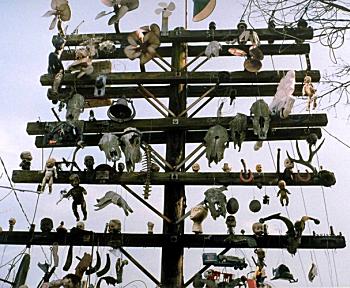
Mike Smith
_______________________
How to defend the Enlightenment
Tzvetan Todorov interviewed by AC Grayling
eurozine
...it was a kind of wisdom of Enlightenment thinkers that they perceived reason within its limits. And there are two dangerous caricatures of this position. One is to say that reason is only desiccating, and too dry and doesn't understand anything. And the other, which is no less dangerous, is to eliminate all non-discursive expression of knowledge, to eliminate the place for arts, for myth, for all visions for the image as such, which is a different kind of knowledge of the world. In a way I think we have to be cautious about both dangers, both reductions. And this is in a way what I like in the Enlightenment and what I try to remind the reader – that the Enlightenment was this complex moment when people were able to fight for reason so that reason would replace traditional authority. But at the same time, they were aware of the limits of reason. Now, specifically about Rousseau and the passions, I think he may have that following because of certain pages of his writings. But at the same time, books like those I mentioned – Discourses, Social Contract or Emile – are monuments of logical argumentation. So they don't qualify really as attacks on reason. It is true that in his later, most paranoid writings he can have developments of that kind, and so his heirs within the Romantic movement would follow that line. But the Romantic Movement itself was not all of a piece. Victor Hugo, to take the great French figure of Romanticism, was very much a defender of reason, although he would leave a place for passions. If you look at literature in the eighteenth century, which we should, because the writers were just as much an expression of the sensibility and mentality of the age, I think we find both the defenders of passion and of reason. Rousseau was maybe a defender of passion, or Samuel Richardson. But at the same time, the line of Diderot and Laurence Sterne wasn't really a domination of irrational passions overwhelming human beings. They were very ironic and aware of all the traps human beings could fall in. ...(more)
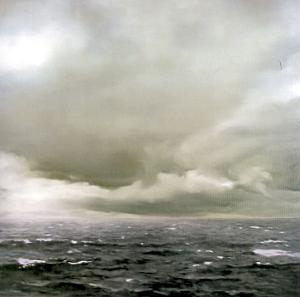
Gerhard Richter
b. Feb. 9, 1932
_______________________
Excerpts from "Inserting the Mirror"
Rosemarie Waldrop
Given the distance of communication, I hope the words aren't just idling on the map on
my fingertips, but igniting wild acres within the probabilities of spelling. As a hawk
describes circles whose inner emptiness bespeaks the power of gravity, where the lever
catches on a cog of the world. There, the mild foreground for buying bread, for the
averted doubt that the hand will encounter. There, with dizzy attention, I hold the be-
cause, another key to the bewitchment of words.
...(more)
Between Tongues: An Interview with Rosmarie WaldropConjunctions

Holon
Malwine Rafalski
via Shane Lavalette
_______________________
Sestina
Elizabeth Bishop
September rain falls on the house.
In the failing light, the old grandmother
sits in the kitchen with the child
beside the Little Marvel Stove,
reading the jokes from the almanac,
laughing and talking to hide her tears.
(....)
With crayons the child draws a rigid house
and a winding pathway. Then the child
puts in a man with buttons like tears
and shows it proudly to the grandmother.
But secretly, while the grandmother
busies herself about the stove,
the little moons fall down like tears
from between the pages of the almanac
into the flower bed the child
has carefully placed in the front of the house.
Time to plant tears, says the almanac.
The grandmother sings to the marvelous stove
and the child draws another inscrutable house.
...(more)

Elizabeth Bishop
(8 February 1911 – 6 October 1979)
photo by Joseph Breitenbach
Rough Gems
David Orr reviews Elizabeth Bishop's Edgar Allan Poe & The Juke-Box: Uncollected Poems, Drafts, and Fragments
You are living in a world created by Elizabeth Bishop. Granted, our culture owes its shape to plenty of other forces — Hollywood, Microsoft, Rachael Ray — but nothing matches the impact of a great artist, and in the second half of the 20th century, no American artist in any medium was greater than Bishop (1911-79). That she worked in one of our country's least popular fields, poetry, doesn't matter. That she was a woman doesn't matter. That she was gay doesn't matter. That she was an alcoholic, an expatriate and essentially an orphan — none of this matters. What matters is that she left behind a body of work that teaches us, as Italo Calvino once said of literature generally, "a method subtle and flexible enough to be the same thing as an absence of any method whatever." The publication of "Edgar Allan Poe & the Juke-Box," which gathers for the first time Bishop's unpublished material, isn't just a significant event in our poetry; it's part of a continuing alteration in the scale of American life....(more)
A Formal, Melancholy Soul: Elizabeth BishopCasey N. Cep
_______________________

Dancing
From the series 'Forest'
Jitka Hanzlová
.....................................................
Into the woods
John Berger on Jitka Hanzlová
google cache
A forest is what exists between its trees, between its dense undergrowth and its clearings, between all its life cycles and their different timescales, ranging from solar energy to insects that live for a day. A forest is also a meeting place between those who enter it and something unnameable and attendant, waiting behind a tree or in the undergrowth. Something intangible and within touching distance. Neither silent nor audible. It is not only visitors who feel this attendant something; hunters and foresters who can read unwritten signs are even more keenly aware of it.
“I went to the forest-hills early in the morning when the forest awakes. Standing there I breathed in the wind, the unruffled voices of the birds and the silence which I love. And then when I was concentrating on a picture, I stopped hearing the silence around me.
“It was as if I was somewhere else, like in a film. The forest started to move and, as I looked through the camera, I experienced fear. Maybe it was just the framing and the stillness of the evening. As if the birds and the crickets had stopped their singing, as if the wind had come to a stop in the valley. Nothing but nothing to hear. No birds, no wind, no people, no crickets.
“The darkness of the light and this other silence made my hair stand on end . . . I could not exactly place the fear, but it was coming from the inside. It was the first time I felt this so intensely, but not the last. I escaped! What’s the basis of this fear of mine? Why? I’m not afraid of animals or of the forest. The place is safe.”
_______________________
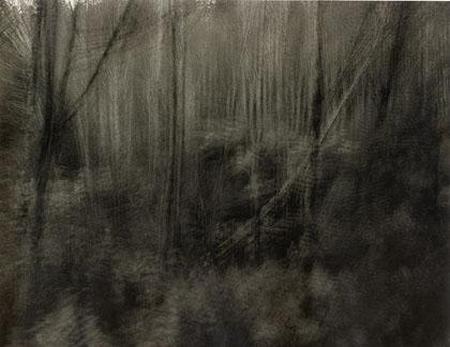
Forest #II
Pavel Banka
1 2
_______________________
The Anatomy of Melancholy
Robert Burton
b. Feb. 8, 1577
That men are so misaffected, melancholy, mad, giddy-headed, hear the testimony of Solomon, Eccl. ii. 12. "And I turned to behold wisdom, madness and folly," &c. And ver. 23: "All his days are sorrow, his travel grief, and his heart taketh no rest in the night." So that take melancholy in what sense you will, properly or improperly, in disposition or habit, for pleasure or for pain, dotage, discontent, fear, sorrow, madness, for part, or all, truly, or metaphorically, 'tis all one. Laughter itself is madness ....
_______________________
Visits to St. Elizabeths
Elizabeth Bishop
(....)
These are the years and the walls of the ward,
the winds and clouds of the sea of board
sailed by the sailor
wearing the watch
that tells the time
of the cranky man
that lies in the house of Bedlam.
This is a Jew in a newspaper hat
that dances weeping down the ward
over the creaking sea of board
beyond the sailor
winding his watch
that tells the time
of the cruel man
that lies in the house of Bedlam.
This is a world of books gone flat.
This is a Jew in a newspaper hat
that dances weeping down the ward
over the creaking sea of board
of the batty sailor
that winds his watch
that tells the time
of the busy man
that lies in the house of Bedlam.
...(more)
_______________________
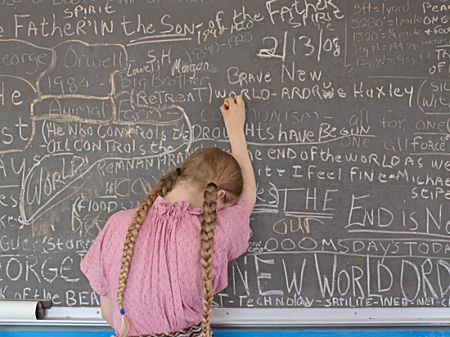
Lucas Foglia
_______________________
Hallucinations of Invisibility
From Silence to Delirium
Ted Hiebert
ctheory
A delirious silence -- the sound of negative space. Inverting presence along with its reflections. Also, and more importantly, inverting absence. And its reflections too. The limits of a reasonable thinking are those that break down when confronted with reflected absence. A confounding assertion in that it refers no longer to the impossibility of presence, but also the impossibility of absence itself. An unavoidable and inexhaustible presence of nothingness.
The delirious image -- no longer the image of reflected worlds, but the impossible image of inverted reflection. Between selfless self-portraits and portraits of selflessness, not a void but the paradoxical variations of reflected play. Figures of inversion, absurd and delirious. A silent cacophony of tongue-less twisters.
At the limits of a reason of this sort lies, not only silence but also the irrational and its various formulations. And to rise to this challenge, three theses. The thesis of the absurd, Camus' silent universe and Regine Robin's Vampire Narcissus. The thesis of paradox, Virilio's world of sightless vision and the myth of the nymph Echo. And the thesis of delirium, Baudrillard's world of holographic thinking and Echo turned vampire. Consequently, a theorizing of the signs of inversion and impossibility -- reformulating a world that is no longer reasonable; a world that is transformed, from silence to delirium. (...)
We are no longer in the process of disappearing. Rather, we have already disappeared. Everywhere we look for signs, not that we are still here, but that our disappearance was not inevitable -- that it 'could have been' different -- as though if we had somewhere made a mistake we could live with the consequences. Yet if such could ever have been the case there is no trace of it left. What we encounter is not an acceleration towards disappearance but only the realization that we never were. It is not our disappearance that was evitable -- but only our appearance in the first place.
We encounter ourselves now -- indivisible from the world. We have become bicameral but not in the sense used by Jaynes -- rather precisely the inverse. It is not that we have once more begun to hear voices -- but rather that we are merely the voices themselves. An invisible race in a delirious world. Not merely cut off from the world, but for the first time indistinguishable from it. Perhaps for the first time truly alive. From here it is useless to try to remember the life we knew before. With a delirious mind now we must proceed only to forget.
And so we come full circle from where we began. It is no longer us asking the universe for the meaning of life, but the universe who quietly asks us. With a smile, but without irony, we reply simply that we have forgotten. ...(more)
_______________________
Armed Joy [pdf]
Alfredo M. Bonanno
Translated by Jean Weir
Let's be done with waiting, doubts, dreams of social peace, little compromises and naivety. All metaphorical rubbish supplied to us in the shops of capitalism. Let's put aside the great analyses that explain everything down to the most minute detail. Huge volumes filled with common sense and fear. Let's put aside democratic and bourgeois illusions of discussion and dialogue, debate and assembly and the enlightened capabilities of the Mafiosi bosses. Let's put aside the wisdom that the bourgeois work ethic has dug into our hearts. Let's put aside the centuries of Christianity that have educated us to sacrifice and obedience. Let's put aside priests, bosses, revolutionary leaders, less revolutionary ones and those who aren't revolutionary at all. Let's put aside numbers, illusions of quantity, the laws of the market. Let us sit for a moment on the ruins of the history of the persecuted, and reflect.
The world does not belong to us. If it has a master who is stupid enough to want it the way it is, let him have it. Let him count the ruins in the place of buildings, the graveyards in the place of cities, the mud in the place of rivers and the putrid sludge in the place of seas. The greatest conjuring spectacle in the world no longer enchants us.
We are certain that communities of joy will emerge from our struggle here and now.
And for the first time life will triumph over death.
Alfredo M. Bonanno in the Anarchist Library
_______________________
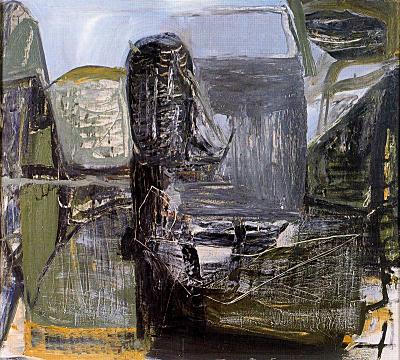
Mullion Bay
Peter Lanyon
b. Feb. 1918
_______________________
The Map
Elizabeth Bishop
(....)
Mapped waters are more quiet than the land is,
lending the land their waves' own conformation:
and Norway's hare runs south in agitation,
profiles investigate the sea, where land is.
Are they assigned, or can the countries pick their colors?
-What suits the character or the native waters best.
Topography displays no favorites; North's as near as West.
More delicate than the historians' are the map-makers' colors.
...(more)
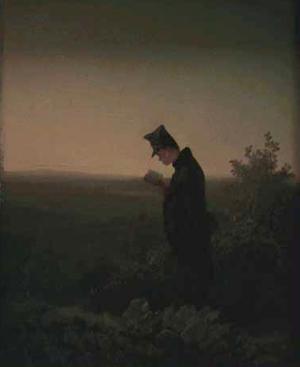
La Lecture du bréviaire
1845
Carl Spitzweg
b. Feb. 5, 1808
_______________________
'Why are you weeping?' said Bembel Rudzuk.
'I am suffering from an attack of history,' I said.
'It will pass,' said Bembel Rudzuk.
-
Pilgermann, Russell Hoban, b. Feb 4 1925
_______________________
The Lens of Images
David Cox
Desire, Commodities, Media and Hacking
Images are themselves a lens on the culture which makes them. Walter Benjamin was both right and wrong about art in the age of mechanical reproduction. Right in that as images proliferate from spectacle, their overall value depreciates. Wrong in that manufactured images are worth less than their real world referent. As manufactured goods accelerate away from the decade in which they were made, they themselves gain a kind of new cultural value. Some commodities seem to accrue more cultural gravitas than others. The dodgiest of global trade in junk, the antique market bears testimony to the ways in which even the most trivial of manufactured items can become obscure objects of desire once made to enter the domain commodity relations.
(....)
The Worm Hole Theory of Collage
William Burroughs insisted that his cut-up works of writing had properties of prediction about them. Implicit within this idea is that collage is a kind of dimensional travel, where intended meanings become disrupted so radically that the act of reworking words in a newspaper article or shots in a film actually disrupts the time/space continuum. Try showing a collage work to anyone not up with radical postmodernism and just sit back and wait for the questions about authorship, ownership, copyright and other methods of psychological police torture in the service of the State and Capital....(more) _______________________
Quick Fix
William S. Burroughs
b. february 5, 1914
(....)
We are all not that much better than new earth aches.
There is no place else to go
The theater is closed
There is no place else to go
The theater is closed
Cut word lines
Cut music lines
Smash the control images
Smash the control machine.
...(more)
William S. Burroughs Films and sound files ubuweb
_______________________

Winterlude
Ottawa
February 5-21, 2010
photo - mw
_______________________
17 Reasons Why . . .
. . . I Love the Work
of Michael McClure!
Steven Fama
the glade of theoric ornithic hermetica
12.
The Steinian repetition in “Stanzas From Maui”
(1991)
Of course, repetition, especially when used (forgive me) repeatedly, also hearkens back to Gertrude Stein, she of the tripled rose, and character studies in which repetition, and repetition with variation, are key principles. In The Making of Americans, a masterwork of repetition, Stein (via her narrator) insists that repetition is both ubiquitous, important for a full understanding, and way of expression that is loved by most. Of course, these points are made in part via . . . repetition! Take a minute and groove with Gertrude:
As I was saying every one always is repeating the whole of them. As I was saying sometimes it takes many years of listening, seeing, living, feeling, loving the repeating that is in some before one comes to a completed understanding in them, the repeating coming out of them. This is now a description, of a way of hearing, seeing, living, feeling, loving repetition.
Mostly every one loves some one’s repeating. Mostly every one then, comes to know then the being of some one by loving the repeating in them, the repeating coming out of them. This is now a history of getting completed understanding by loving repeating in every one the repeating that is always coming out of them . . . .
Stein in The Making of Americans goes on as in this quotation, regarding repeating, for paragraph after paragraph, page after page. The bit set out above is actually just a taste: it comes from around the middle of an approximately 20 page passage that repeatedly repeats regarding repetition!
McClure’s use of repetition in “Stanzas From Maui” is not nearly as intense as the example from Stein (what could be?), but it is intense. Here’s a sequence, from near the end of the poem, in which the repetition, and much else, is especially vibrant:
THIS IS SPONTANEOUS AND PLANNED
SPONTANEOUS AND PLANNED
as the wave ruffle, wave ruffle, wave ruffle, ripple
ripple, payload, payload, payload
of tiny shells, tiny tiny shells in the surf lap
tiny tiny shells in the blue warm surf lap
when you pick up a handful
when you bend, plunge hands into the surf,
and pick up a handful
of tiny shells in the surf lap
pick up a handful of tiny shells and hold them to the sun
–all tiny shapes and colors–pink, mauve, brown and foamy
–pink mauve white brown, blue flash, silver foaming,
and hold them to the sun
hold them to the sun
hold them to the sun
hold them to the sun
hold them to the sun
hold these shells upward to the sun
hold these shells upward to the sun
shells upward to the sun
shells upward to the sun
shells upward to the sun
hold these shells upward to the sun
outward in your hand
OUTWARD IN YOUR HAND
UPWARD IN YOUR HAND AND PALM
UPWARD IN YOUR HAND AND PALM
This has most Steinian feel to it, I think, and I also think it works extremely well. Here’s a poet falling in love, or re-living in language the moment when love exploded in blossom, the building of thought and emotion. These lines read almost as a slo-mo film, with many frames repeated, would look. Gertrude, I believe, would love it madly, and I hope you do too!
...(more)
_______________________

Retail Spaces
Thomas Meyer
_______________________
More and more I find that life is a series of disappearances followed usually but not always by reappearances; you disappear from your morning self and reappear as your afternoon self; you disappear from feeling good and reappear feeling bad. And people, even face to face and clasped in each other's arms, disappear from each other.
-
Russell Hoban, Fremder
_______________________
Wittgenstein's Ladder
David Lehman
“My propositions serve as elucidations in the following way: anyone who understands them eventually recognizes them as nonsensical, when he has used them––as steps––to climb up beyond them. (He must, so to speak, throw away the ladder after he has climbed up it.)”
-
Ludwig Wittgenstein, Tractatus
1.
The first time I met Wittgenstein, I was
late. “The traffic was murder,” I explained.
He spent the next forty-five minutes
analyzing this sentence. Then he was silent.
I wondered why he had chosen a water tower
for our meeting. I also wondered how
I would leave, since the ladder I had used
To climb up here ha fallen to the ground.
(....)
4.
On leave in Vienna in August 1918
he assembled his notebook entries
into the Tractatus. Realizing it provided
the definitive solution to all the problems
of philosophy, he decided to broaden
his interests. He became a schoolteacher,
then a gardener’s assistant at a monastery
near Vienna. He took up architecture.
...(more)
_______________________
Adam’s Family Jewels
Tibor Krausz
Killing the Buddha
It’s time to face up to it: Just as the unadulterated originals of popular folk tales collected by the Brothers Grimm were often sadistic, scatological and pornographic (no, Prince Charming didn’t wake up Sleeping Beauty with just a kiss), so too the Bible is no innocent bedtime story. It isn’t a fount of moral clarity, either.
_______________________

photo - mw

Kelmscott Manor: Attics
1896
Frederick H. Evans
1853-1943
1 2 A Record of Emotion: The Photographs of Frederick H. Evans
the Getty Center.
via
_______________________
Psychoanalysis: An Elegy
Jack Spicer
(....)
What are you thinking?
I am thinking of how many times this poem
Will be repeated. How many summers
Will torture California
Until the damned maps burn
Until the mad cartographer
Falls to the ground and possesses
The sweet thick earth from which he has been hiding.
What are you thinking now?
I am thinking that a poem could go on forever.
...(more)
mad cartographer (PoemTalk #28)
Julia Bloch, CA Conrad, Rachel Blau DuPlessis and Al Filreis on Spicer's Psychoanalysis: An Elegy
_______________________
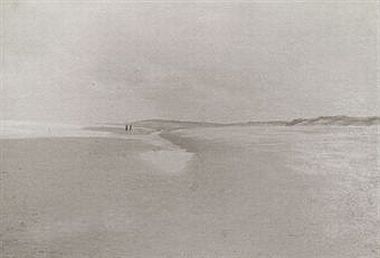
Sea and Sky and Sand
1899
Frederick H. Evans
_______________________
Speak not always
Of the leaves ·
Violent breeze ·
Of the smashing
Of ripe quinces ·
Of the coming
Of destroyers
At year's end.
Of the quiver
Of the darters
In bad weather
And the lights
With the flicker
Transient.
Stefan George
translated by Justin E. H. Smith
Of the Smashing of Ripe Quinces: Notes on Stefan George
Justin E. H. Smith
If I confess a sympathy for what Stefan George called 'pure aestheticism' in poetry, this is not because I believe myself to be above politics, but because I believe that poetry is above current events, and by 'current' I mean whatever social world human beings have managed to throw together for themselves, for now, until it comes apart. Leave engagement with that to prose, which is to say to the vastly greater part of what language does in this, what Walter Benjamin rightly called our 'prosaic age'....(more)
_______________________

Wells Cathedral: A Sea of Steps
Frederick H. Evans
1903
_______________________
Geneses, Genealogies, Genres, and Genius:
The Secrets of the Archive
Jacques Derrida
Translated by Beverley Bie Brahic
aaaarg - free reg. req.
That this Omnipotence-other deprives us, in the name of literature, of the right or the power to choose between literature and non-literature, between fiction and documentary, is a new state of affairs in the world and in the history of humanity. The consequences and implications are mind-boggling. Not just in the realm of law (for even the genesis of the law is at stake here). The situation's givens are unfathomable and fascinating for a great national Library to which are entrusted, like so many challenges, archives whose status as literature we are hard put to decide upon, whether that which is legitimately classified, and legally copyr ighted in the category of 'literature', does or does not shelter reliable references to what occurred 'in reality ', an object therefore for historians or biographers; or whether it even tallies, thanks to a homonymy ever ready to trick us, with realities indexed as such in documents of a testimonial or testamentary nature. The librarian will always find it difficult to decide if the referent of such and such a text and document is real or fictional, or in the case of the texts of dreams, even more undecided between reality and fiction, unemployed materials, if I may say, or materials not yet literary with an eye to literature, available for literature explicitly or implicitly destined to be put to literar; work, therefore already literary though not yet literary etc. Those who, here in this room or among her friends, readers or admirers, are already familiar with the Cixous archive know to what degree in her case especially, more than elsewhere, such problems are and will become increasingly crucial, forever insoluble perhaps, thus at the heart of indecidability, cooperating in a decisive manner with the problematisation, elaboration, transformation and renewal of all these questions. These are practical questions, certes, practical first of all in the technical sense of the term (classification, dating, categorising, cataloguing, delimiting the internal boundaries of the corpus) , but also practical questions in the ethical or deontological sense of the term (what has one the right to classify as literary fiction or as non-literary document? Who authorises whom to unveil what of the secret or of the non-secret in a public work of literature? Who authorises whom and authorises himself what in order to permit the divulging of such and such identifiable filiations or relationships in the genesis of the work employing private non-literary documents (dreams and letters, for instance) it has been legally decided will never or not for decades enter the public domain, etc.?). _______________________
Only Poems Can Translate Poems:
On the Impossibility and Necessity of Translation
Ellen Welcker
The Quarterly Conversation
_______________________
The Work of Inner Speech
A Word is the Search for It, part 2
an essay by Mark Willis (1998-2001)
a blind flaneur
Inner speech is not the antecedent of external speech, nor is it merely the reproduction of external speech in memory. In differentiating them, Vygotsky insisted that inner and external speech operate in conjunction. As external speech is the materialization of thought into words, inner speech is the sublimation of words into thought. “In external speech thought is embodied in words; in inner speech words die as they bring forth thought,” Vygotsky wrote. Evoking the image of Mandelstam’s blind swallow, he described inner speech as “a dynamic, shifting, unstable thing, fluttering between word and thought”.
A chance encounter with Osip Mandelstam on the streets of Voronezh, the provincial city where he was exiled in 1934-36, would have revealed some of the behaviors Vygotsky observed in his experiments. Mandelstam composed verse in the workshop of inner speech. The best indication that he actually was writing was the silent movement of his lips as he walked about. Even with his longer prose works, he seldom wrote directly on paper. Mandelstam evinced a blithe indifference to written texts not uncommon among Russians in the Stalin era.
Nadezhda Yakovlevna would write down his daily output of words at the end of the walk. He trusted her, Akhmatova, and the secret police to keep track of his manuscripts. Nadezhda Yakovlevna knew Mandelstam’s work intimately, and her memoirs are filled with insight about his writing process. She evidently read Vygotsky’s book in the 1960s, for she mentions it (mistakenly reversing the title as Language and Thought) in her sole reference to the psychologist. In Hope Against Hope she quotes “The Swallow” and describes Mandelstam’s composition process in terms that parallel Vygotsky’s concept of inner speech:
The process of composing verse also involves the recollection of something that has never before been said, and the search for lost words is an attempt to remember what is still to be brought into being (”I have forgotten the word I wished to say, like a blind swallow it will return to the abode of shadows.” ) This requires great concentration, till whatever has been forgotten suddenly flashes into the mind. In the first stage the lips move soundlessly, then they begin to whisper and at last the inner music resolves itself into units of meaning: the recollection is developed like the image on a photographic plate. ...(more)
A Word is the Search for It part 1 2 3 4
_______________________
Salinger links
assembled by Ron Silliman
_______________________
It Feels So Good To Help
Michael Shaw
bagnews

"What happens to poor countries when they embrace free trade? In Haiti in 1986 we imported just 7000 tons of rice, the main staple food of the country. The vast majority was grown in Haiti. In the late 1980s Haiti complied with free trade policies advocated by the international lending agencies and lifted tariffs on rice imports. Cheaper rice immediately flooded in from the United States where the rice industry is subsidized.
In fact the liberalization of Haiti's market coincided with the 1985 Farm Bill in the United States which increased subsidies to the rice industry so that 40% of U.S. rice growers' profits came from the government by 1987. Haiti's peasant farmers could not possibly compete. By 1996 Haiti was importing 196,000 tons of foreign rice at the cost of $100 million a year. Haitian rice production became negligible. Once the dependence on foreign rice was complete, import prices began to rise, leaving Haiti's population, particularly the urban poor, completely at the whim of rising world grain prices. And the prices continue to rise."
-
from: Eyes of the Heart: Seeking a Path for the Poor in the Age of Globalization by Jean-Bertrand Aristide. March, 2000.

The Memories of Angels
Luc Bourdon's tribute to Montreal in the 50's and 60's
NFB
80 min 23 s
_______________________
Passage
Rae Armantrout
1
I held the framework
of my life in mind
with some precision.
I knew when I was
where — or where I was
when — but not many
incidents of my past had
actually been preserved.
Instead the frame served
as a cargo cult runway,
forever inviting
the future to appear.
I existed finally
as the idea
of temporal extension.
...(more)
.....................................................
Interview with Rae Armantrout
Chicago Weekly Blog
Much of the found language in your poems is familiar to the reader, or evokes familiar contexts. Since your poems display “the interventions of capitalism into consciousness” (to quote your interview with Lyn Hejinian), they seem to alter those contexts for your readers: illuminating, problematizing, re-enchanting, questioning. Do you see your use of familiar language as aiding or instructing readers to see those words and contexts differently?
Yes, in a way. I don’t want to be pedantic. I’m just trying to recreate for the reader the experience I had. If something made me do a double take, I want to make the reader look twice too. I guess one example might be these lines from my poem “Integer” (in Versed).
These temporary credits
will no longer be reflected
in your next billing period.
Those words were lifted directly from my phone bill. I was in a state of mind which allowed me to hear their somewhat ominous tone. Is this our modern version of “Gather ye rosebuds while ye may?” I guess I wanted to reader to hear that too. In the larger poem that section occurs in relation to a consideration of reflection in general....(more)
Rae Armantrout at The Poetry Foundation and PennSound
_______________________

Looking Inside
Marla Leigh Caplan
_______________________
Head Weight
David Albahari
Translated from SerbianSerbian by Ellen Elias-Bursac
words without borders
In all honesty, Ruben was at a loss to explain what was happening to him. He told his friends and family a story about feeling tired and drained, while he in himself saw a different sort of picture: somebody, who knows who, some huge and powerful being was squeezing him the way the last squirts of toothpaste are squeezed from a toothpaste tube. The crush of those huge fingers, the blunt thumb and the slightly angular index finger, produced so much pain at times in Ruben that, lying in bed, or mid-stride, he could barely hold back his screams. His life, he realized one morning, had become, over time, anticipation of pain, as if nothing else mattered and as if the pain had become a measure for all that shaped his life. His visits to doctors produced no tangible results, all his test results were fine, or, at the very worst, on the border, but never beyond it, over onto the other side.
"From a physiological perspective," a doctor told him, "your health may not be the best it has ever been, but close to it, at least as far as your body is concerned." He added, "You have nothing to worry about."
"What should I do, then," asked Ruben, "which direction should I take?"...(more)
_______________________
La Libertad
Guillermo Castro
“Soiled as the grass” warbled Ana Belén in my dream
And who am I to argue with my subconscious?
Though I did not actually wake up soiled
Thank you Marlboro Lights
For masking my own musky smell
Let smoke rings twist and disappear freely
In front of my stern black shades
While the little boy in a tie-dye top
Stumbles toward the breakers
With his two gray-haired mommies in tow
A cloud moves the light changes two prepubescent cliques
Go by and I’m back at my deeply scarred
Desk in the third grade enraptured by the tale
Of the flamingos who showed up late to the dance
Wearing snake skin stockings
That did not fly with the hosts
Coral snakes as it turned out
So careful where you go dancing
And check with your hosts about proper attire
Lest they bite you on the legs until they bleed and burn
But not me I love legs
Especially those attached to Pilobolus dancers
Gliding across the stage on their bellies
By way of the oldest trick in childhood
The sheet of plastic doused with a garden hose
I’m reminded of that Ashbery line
About what keeps the ocean from sliding off the planet
And that nincompoop at work who thinks global warming is “crock”
...(more)
Guillermo Castro
Two Poems
Otoliths - sixteen
_______________________

A long slow look…
text and photos by Marla Leigh Caplan
Camera Obscura
In my recent work, I have been engaged in an obsessive investigation into notions of artifice and the construction of beauty. The photographs in the Vanitas series are sets in which elaborate and eventually rotting botanical arrangements are installed in front of various photographic backdrops, mirrors, and windows. The images simultaneously look inside and out, with elements of reflection confusing the distinction between interior and exterior spaces and presenting multiple points of view. I am interested in a certain ambiguity in pictures where the collapse of foreground and background onto one plane suggests our perceptions of the world can be layered in one moment. Testing assumptions of belief and photographic truth, the images continue to give evidence of scenarios that never actually existed. They are absolutely literal, and yet continue to resist a precise meaning.
_______________________
ARCP 7: Lacan and Critical Psychology
Annual Review of Critical Psychology
Part 1 consists of articles that are addressed directly to questions of the applicability of a specifically Lacanian psychoanalysis to critical disciplines. Authors of these articles present concerned analyses and considerations of the effects upon the discipline(s) of an engagement with Lacanian psychoanalysis. Part 2 consists of articles that take a particular concept of Lacan’s and interrogate it for its utility, effects, and consequences for critical research. Part 3 consists of articles that present critical research and/or practice that incorporates a wholly or partially Lacanian informed methodology. Part 4 consists of two review essays that - far from presenting any merely straightforward ‘book review’ - crucially engage with the problematic involvement of Lacan with critical psychology. Finally, Part 5 of this volume consists of two interviews: one with Slavoj Žižek conducted by Ian Parker, and the other with Karolos Kambelopoulos conducted by Ian Parker, Erica Burman and Stavros Psaroudakis.
_______________________
Tractatus Logico-Philosophicus
Ludwig Wittgenstein
Translated by D. F. Pears and B. F. McGuinness
aaaarg - reg. req.
from Wittgenstein's introduction
The book deals with the problems of philosophy, and shows, I believe, that the reason why these problems are posed is that the logic of our language is misunderstood. The whole sense of the book might be summed up in the following words: what can be said at all can be said clearly, and what we cannot talk about we must pass over in silence.
Thus the aim of the book is to draw a limit to thought, or rather—not to thought, but to the expression of thoughts: for in order to be able to draw a limit to thought, we should have to find both sides of the limit thinkable (i.e. we should have to be able to think what cannot be thought).
It will therefore only be in language that the limit can be drawn, and what lies on the other side of the limit will simply be nonsense. _______________________

Still Waters: The Poetry of P.K. Page
Donald Winkler
1990
NFB
38 min 2 s
_______________________
Howard Zinn remembered in The Progressive
.....................................................
Saying goodbye to my friend Howard Zinn
Alice Walker
I was Howard’s student for only a semester, but in fact, I have learned from him all my life. His way with resistance: steady, persistent, impersonal, often with humor, is a teaching I cherish. Whenever I’ve been arrested, I’ve thought of him. I see policemen as victims of the very system they’re hired to defend, as I know he did. I see soldiers in the same way. (....)
The question remains: Where do our friends and loved ones go when they die?
They can’t all go back to Boston, or wherever they’ve lived their most intense life.
I fell asleep, after leaking tears for Howie most of the day: my sweetheart’s shirt was luckily absorbent and available to me, and after tossing and turning almost all night, I had the following dream: We (Someone and I) were looking for the place we go to when we die. After quite a long walk, we encountered it. What we saw was this astonishingly gigantic collection of people and creatures: birds and foxes, butterflies and dogs, cats and beings I’ve never seen awake, and they were moving toward us in total joy at our coming. We were happy too. But there was nothing to support any of us, no land, no water, nothing. We ourselves were all of it: our own earth. And I woke up knowing that this is where we go when we die. We go back to where we came from: inside all of us....(more)
via languagehat
_______________________
A Tale of Two Cities
The Vancouver you see, and the one you don’t
Gary Stephen Ross
Photographs by Grant Harder
Any city of consequence is, from the outside, a lamination of clichés; Vancouver, even more than most places, lends itself to spoof. The melodramatic views, the dependable wackiness of local (and provincial) politics, the green roofs and sustainably harvested spot prawns and Critical Mass cycling rallies, and, especially, the alternating smugness and insecurity of the citizenry: what’s not to parody? Everything’s in 3-D. You want drug addiction and wrenching, in-your-face psychosis the likes of which you’ll find nowhere else? Stroll through the Downtown Eastside, a twenty-square-block human zoo. Want to visit an Asian enclave that’s a cyberlike parallel universe? Check out the Aberdeen mall in Richmond, south of the city proper: two solitudes, Pacific variety. Think you’ve got a cool urban recreational space where you live? Try the spectacular, 400-hectare promontory called Stanley Park, with its bald eagles, heron rookery, and ever-shifting vistas of ocean, mountains, and container ships at anchor, awaiting their turn at the gateway to the Pacific Rim.
The trouble with clichés, of course, is that they heighten reality while bleeding it of subtlety. And so it’s possible to be startled by Vancouver, right there in front of you, but not quite take it in, as you do a killer whale that breaches suddenly, once, before disappearing; or to admire the city without seeing beyond its fetching outline, as you might a server at Cactus Club, a “casual fine dining” chain staffed by lush young women in low-cut black dresses, some of whom are no doubt putting themselves through medical school....(more)
_______________________
...as the world’s attention shifts from financial rescue to financial reform, the quiet success stories deserve at least as much attention as the spectacular failures. We need to learn from those countries that evidently did it right. And leading that list is our neighbor to the north. Right now, Canada is a very important role model.(....)
...when things fell apart, the consequences were very different here and there. In the United States, mortgage defaults soared, some major financial institutions collapsed, and others survived only thanks to huge government bailouts. In Canada, none of that happened. What did the Canadians do differently?
-
Paul Krugman
_______________________
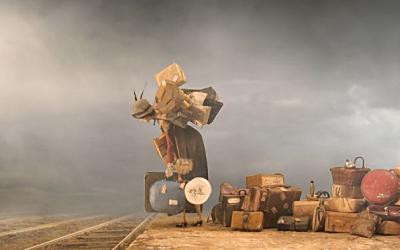
Madame Tutli-Putli
confronts her demons
Chris Lavis & Maciek Szczerbowski
2007
national film board
17 min 15 s
_______________________
Words Without Borders
February 2010: (Worth) Ten Thousand Words, Part IV: International Graphic Novels

photo - mw
_______________________
"To rule forever," continues the Chinaman, later, "it is necessary only to create, among the people one would rule, what we call...Bad History. Nothing will produce Bad History more directly nor brutally, than drawing a Line, in particular a Right Line, the very Shape of Contempt, through the midst of a People,-- to create thus a Distinction betwixt 'em,-- 'tis the first stroke.-- All else will follow as if predestin'd, unto War and Devastation."
-
Pynchon, Mason & Dixon
_______________________
Taking Shade with Buddha
Mark Murphy
affinity
We are the public statues, stirring, stirring
in the town squares at night.
We are private beings, moving, moving
through this public space.
We are strangers in the head, clutching, clutching
at our ribboned hats.
We are Ithaka’s wings, moving, moving
in the scattered breeze.
We are the Bronte sisters, dreaming, dreaming
of dying, always dying.
We are Anne, Emily and Charlotte, moving, moving
through the graveyard of our father’s ministry.
We are the bronchial children, playing, playing
in the grounds of the Parsonage.
We are the breathing ghosts, moving, moving,
breathing and moving in the dark.
We are the human creature, crying, crying,
treading the boards thin.
We are Balzac’s cloak, moving, moving
unceasingly in the night wind.
deaddrunkdublin
_______________________
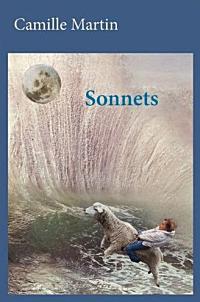
Sonnets
Camille Martin
More than fourteen lines
James Mc Laughlin reviews Camille Martin's Sonnets
Stride Magazine
When I first read the title Sonnets my experimentalist conditionings began to freeze frame as if hit by a medieval Petrarchan truck driven by a deranged and groping John Donne. 'Oh no, holy sonnets,' I'm thinking, recalling a rather dry lecture on the vagaries and wonders of the Italian job as opposed to the Spenserian job. I'm remembering counting iambs and pentameters and recalling the rules: first eight lines of octave abbaabba - followed by six lines or 'sestet'. I'm shouting to the mirror 'Milton thou thoudest be living at this hour!'; I'm calling to the God of Shakespeare 'Shall I compare thee to a summer's day!'; I'm saying 'look Stella we can't go into this right now'. I calm down and have a few Saint John's and a Cap Colombie. Then I'm thinking no! It's an experimentalist ruse, subterfuge, scam, deception, ploy, stunt - as the thesaurus offers: that it won't be real sonnets but just fourteen lines of true experimentalist experimentation to experiment with. Aaaaand no it's not this either - but something quite unique.
If you are familiar with Camille Martin's work: the collages, the poems, the essays, the interests, the troubled experiences, then you will know that you don't need to count to fourteen over and over or do the ab's ab's till the six pack glistens. And that its Sonnets Jim but not as we know it....(more)
_______________________
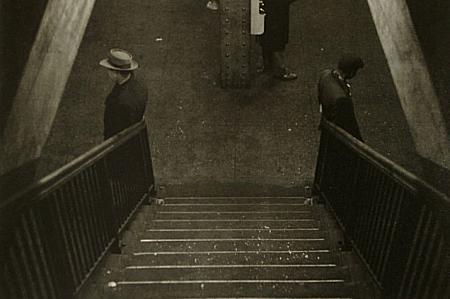
Roy DeCarava
1919 - 2009
1 2
_______________________
Let America be America Again
Langston Hughes
Let America be America again.
Let it be the dream it used to be.
Let it be the pioneer on the plain
Seeking a home where he himself is free.
(America never was America to me.)
Let America be the dream the dreamers dreamed--
Let it be that great strong land of love
Where never kings connive nor tyrants scheme
That any man be crushed by one above.
(It never was America to me.)
(....)
O, yes,
I say it plain,
America never was America to me,
And yet I swear this oath--
America will be!
Out of the rack and ruin of our gangster death,
The rape and rot of graft, and stealth, and lies,
We, the people, must redeem
The land, the mines, the plants, the rivers.
The mountains and the endless plain--
All, all the stretch of these great green states--
And make America again!

Langston Hughes
February 1, 1902 – May 22, 1967
photo by Gordon Parks, Chicago 1941
_______________________
Otoliths Sixteen
southern summer, 2010
Three Poems
William Allegrezza
twenty 5
my words, the bells on the beach,
the damp suffering ivy clinging to brick,
sometimes grow smooth, sometimes
catch as they fall, and though i
want them to speak past the anguish
into your ear, they are sad, peopled with
wind turned into dream hurricanes
that drown. from my voice, the
lament rises, but memory knocks
when i would call and leads me the
long way round when i would stretch
out my hand. and now i wonder
whose words these are that fill
the lines, that fill everything of mind.
An interview with William Allegrezza
Tom Beckett
_______________________
Against Method
Paul Feyerabend
aaaarg - free reg. req.
Now it is, of course, possible to simplify the medium in which a scientist works by simplifying its main actors. The history of science, after all, does not just consist of facts and conclusions drawn from facts. It also contains ideas, interpretations off facts, problems created by conflicting interpretations, mistakes, and so on. On closer analysis we even find that science knows no 'bare facts' at all but that the 'facts' that enter our knowledge are already viewed in a certain way and are, therefore, essentially ideational. This being the case, the history of science will be as complex, chaotic, full of mistakes, and entertaining as the ideas it contains, and these ideas in turn will be as complex, chaotic, full of mistakes, and entertaining as are the minds of those who invented them. Conversely, a little brainwashing will go a longway in making the history of science duller, simpler, more uniform, more 'objective' and more easily accessible to treatment by strict and unchangeable rules.
_______________________
Hegel, Haiti and Universal History
Susan Buck-Morss
aaaarg - free reg. req.
_______________________

Siberia
Emile Hyperion Dubuisson
_______________________
The Dream Keeper
Bring me all of your dreams,
You dreamer,
Bring me all your
Heart melodies
That I may wrap them
In a blue cloud-cloth
Away from the too-rough fingers
Of the world.
Langston Hughes
|



 Janus Head
Janus Head

 The Age of Briggs & Stratton
The Age of Briggs & Stratton









































